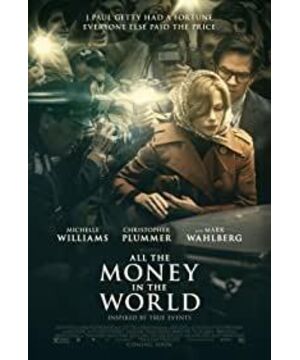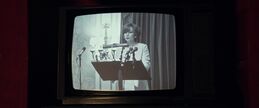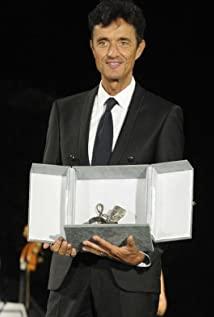"all the money in the world" literally translates as "all the money in the world", but even the richest man in the world cannot be said to have "all" money. Therefore, the title of the film is a bit strange - removing all, "the money in the world", not only is it grammatically and linguistically correct, but also more understandable, but now the title is strange, more like an unfinished sentence The subject of the sentence; in addition, all is the full name of judgment, which, as a symbol, is a sign of generalized reasoning, which means that the film not only recalls a curious story about the kidnapping of a rich man, but also outlines the concept of "money's Nature".
So what does the film say about "essence"?
It's a pity that the movie is certainly not a paper, and the point about money in it is fragmentary and not obvious. To that end, I'll shed some light on the story around "money".
If I knew about Paul Getty's origins, I might elaborate here about his amazing success in the crude oil market, but it's good not to know, because it's better for us to put aside the history and the drama of the story and see Paul Getty is a kind of thinker—he is, of course, a kind of thinker in all the richest men of all time:
- this is how he rejected a stranger who wrote for help: if everyone asked me for help and I gave him money, I would be as poor as you now;
- He talks about the difference between being rich and getting rich again: Being means the state of existence, and it means that in the face of all the big and small risks of being "rich", you must make sure you don't fall into the pit...
He has more about money, about social life. He was a speculative, industrious, thrifty man, and a conservative, miserly man, but he was also a risk-taking, profligate man... His richest man, with these examples, all these adjectives, greatly obscures his position in other Real coordinates in a more abstract world of ideas. In fact, he represents a typical personality in the capitalist society of the 19th and 20th centuries, which is composed of classical liberalism and social Darwinism, and has a typical idea of that kind of personality, and he is " The most successful one.
It was the oil fields of the Middle East that made Getty's fortune, but it was also an idea. This kind of thinking is based on laissez-faire, full competition, and survival of the fittest, and it has brought monopoly and huge rewards from monopoly to those who can most agree and practice this kind of thinking. The chaebols and tycoons who are capable of manipulating the life and death power of most "ill people", Paul is one of the best.
The starting point of this idea of freedom was initially defensive, that is, "I can have the freedom not to be interfered with by...", when it was put forward by Locke and others, it represented the progress of history, and meant that productivity and human nature were about to meet. came a great liberation; but it then became aggressive, especially in the economic sphere, and this free thought became "as a winner, my unbridledness should not be interfered with by any force".
At this point, the so-called "crisis of the capitalist world has appeared", liberalism has become laissez-faire, and the logic of the strong has basically slipped to the inhuman edge of bullying. For 99% of people, society and life are not very good. It is polarized and ruthless. What is even worse is that this kind of society is plausible and reasonable for its ruthlessness.
Mr. Getty said a lot of things like this: For ransom? Then I have more than a dozen children and grandchildren, will there be more than a dozen ransoms to be paid soon? give you money? If so, I would have been as poor as you. Don't you see, this kind of society has also formed a huge oppression on the personalities of the middle class. The consumption power is dwarfed by the unqualified life. The kind of humiliation received by the mother who thought it was worth 1.2 million US dollars of counterfeit antiques is just right. It is the extreme expression of this humiliation; but as mentioned above, don’t think that this “bad society” lacks completeness and legitimacy in theory. The ideological fortress of classical liberalism is: freedom is freedom itself, a free society What it promises is freedom - it never promises a society where everyone is happy and well-off; and it warns with concern that if you, because of conscience, idealism, and moral passion, start to seek freedom at the expense of freedom justice and well-being, that is the worst thing, because it would mean a loss of social vitality, but also a distrust of individual judgment, and liberty, once compromised for any reason, would soon be a kind of Societal solutions that claim to be better, but must be the unifying answer, will come out to rule people, and a powerful central government will monopolize people's right to free choice with lethal conceit!
Therefore, Getty's actions in the film cannot be defined in terms of what is generally understood to be evil and bad. To a certain extent, it is a more pure reflection of an idea in the real world. In this sense, money is an idea, which pushes the things associated with it to the pure and extreme.
So what are the limits of Getty's, classical liberalism?
The answer has been given in the story, called "When someone ties up your family". This is of course illegal and wrong, but it reminds Getty in an extreme way: In fact, we are people, living people, not numbers, although we are "unwell" compared to you, but that's just It's in the economic world, in real life, that I can kill you or save you (the Mark Wahlberg character says something similar). Life is "priceless", it is not "everything has its price" as you think.
That's where all the battles lie. But Getty, who is accustomed to winning by calculating abstract numbers, continued to calculate with his rationality, which not only made him not panic, but also caused him to be difficult to deal with to a certain extent. Didn't the gangster finally get 20% off the 17 million that the gangster wanted? ? Here's another "Getty Story": Li Ka-shing confronted Zhang Ziqiang, who had kidnapped his son and asked for money to pay back the lion. He said calmly: The money I give you now is enough for your life Flower, you go, I won't call the police, but I suggest you don't splurge... Also, my business is very good, I suggest you use your money to buy my stock, it's better... Many people blame Li Ka-shing for this The performance is interpreted as being calm in the face of danger and opening up and closing. In my opinion, it is favoring one over the other. In fact, the richest people are the original supporters of classical liberalism. Their rationality is not the kind that ordinary people can reach. They are not post-construction, concrete analysis of specific problems, and their rationality is the former. Arbitrary, principled, ruthless - but they can penetrate all reason, their highest ideal is to invent a set of logic that can automatically operate and continuously generate money, and their own limit to reason - the existence of other living people ——The feeling is not very sensitive. They don't have the passion of romantics, they are only sensitive to money.
Here comes the second property of money: it opposes, or at least ignores, the lives of people with natural differences, and money counts people as numbers.
In the movie, Mr. Getty finally gave in, not only because he saw the hairy and bloody ears, but also because he began to have some confusion in art and in his review of his life, and he vaguely noticed Another kind of human being, another kind of rational being, and this one isn't that little Getty who was tied up - this dude was idle, had a sense of superiority since he was a child, and learned that by writing to his grandfather as a "book boy" Thought, and more importantly, he was very upset that his mother had brought him back from his father.
This person - the daughter-in-law of Getty in the play, the mother of Getty III.
This woman has a different kind of intuition, strength and excitement. Of course, she used to be dazzled by the high-rise buildings and antiques of the Getty family, but at the critical moment, her selection criteria were completely different from that of Mr. Getty-she wanted to The kind of people who don't want money, she has a different kind of thinking that rivals Getty's. You know, "priceless" was uttered from the mouth of this daughter-in-law for the first time. At that time, Getty corrected the "mistake" of this daughter-in-law who was still adapting to the money world. , but it turned out that she was another right.
However, it should be noted that she was right in the passion caused by a violent kidnapping to get a chance to prove herself. The communists in the film also want to take the opportunity to win a vote. This is really a stroke of genius; Interventionism and leftist politics are all related to this woman.
But in any case, this woman won the battle with Getty—in fact, with their family, not relying on the same logic, the same logic she will lose. Her victory was not a victory of love over selfishness. Her victory depended on a different view of money—giving it away, giving it away, giving it away in exchange for... money.
There is a third essential here about money: money is eternal. The Gettys eventually donated to the museum, and most of today's capitalists seem to be philanthropic, and no country dares to pour milk down the drain in a time of economic crisis (the Gettys do), but they all love money.
Therefore, the impression of this film should not be that mother's love won back her son, nor that selflessness defeated utilitarianism, especially not that communism won capitalism. The abstract and eternal nature of money enables it to serve all ideas and all times, just pay attention to safety, because money is against people.
Finally, a word about the "descendants" of the Gettys, and now, with a "new" in front of classical liberalism, the Gettys are back in a more respectable way... By the way, who does "Getty" remind you of?
Trump has become "probably the most important president" that the poor American people have recently cast out with their feet. After watching this movie, please understand: This man's open mouth and political inaccuracy are by no means rational. With moral inadequacy, demonizing a full-fledged rationalist will not have good fruit to eat.
View more about All the Money in the World reviews











